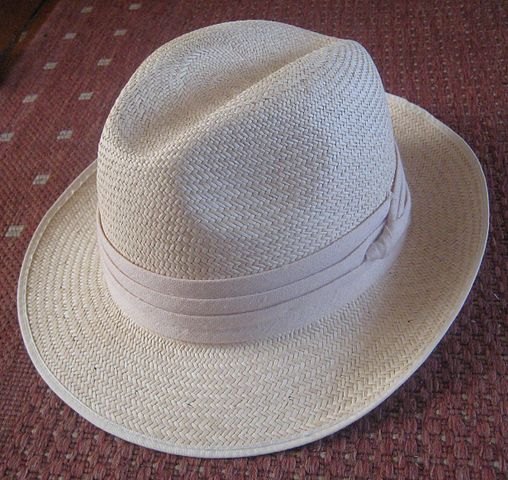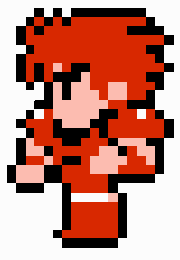
The Fountainhead, part 1, chapter 1
The Fountainhead begins with nudity:
Howard Roark laughed.
He stood naked at the edge of a cliff. The lake lay far below him. A frozen explosion of granite burst in flight to the sky over motionless water. The water seemed immovable, the stone — flowing. The stone had the stillness of one brief moment in battle when thrust meets thrust and the currents are held in a pause more dynamic than motion.
Howard Roark will be our hero for this novel. As is typical of Ayn Rand’s good-guy characters, he’s described in oddly geometric language about angles and planes, as if the book were written by a Martian whose only knowledge of what human beings look like came from old 8-bit video games:

His body leaned back against the sky. It was a body of long straight lines and angles, each curve broken into planes. He stood, rigid, his hands hanging at his sides, palms out. He felt his shoulder blades drawn tight together, the curve of his neck, and the weight of the blood in his hands. He felt the wind behind him, in the hollow of his spine. The wind waved his hair against the sky. His hair was neither blond nor red, but the exact color of ripe orange rind.
…His face was like a law of nature — a thing one could not question, alter or implore. It had high cheekbones over gaunt, hollow cheeks; gray eyes, cold and steady; a contemptuous mouth, shut tight, the mouth of an executioner or a saint.
Er, an executioner or a saint? Are those professions normally considered interchangeable? I thought saints were known for beatific smiles, not for contemptuous grimaces.
As we’ll see, Roark is the stereotypical Randian hero. He has the work ethic and worldview of a factory assembly-line robot. He has no personal life, no interests, no hobbies (except for the occasional skinny-dipping), no friends or family and no desire for either. In fact, the only thing said about his background in the whole book is this amazing paragraph:
Roark’s father had been a steel puddler somewhere in Ohio and had died long ago. The boy’s entrance papers [to college] showed no record of nearest relatives. When asked about it, Roark had said indifferently: “I don’t think I have any relatives. I may have. I don’t know.” He had seemed astonished that he should be expected to have any interest in the matter.
It speaks volumes that Ayn Rand expects us to treat this as a sympathetic, even admirable trait. It’s not that he has no family – it’s that he doesn’t even know if he has a family, because he’s never cared enough to look. This is a bizarre, inhuman attitude. It’s as if he sprang into being out of nothingness, like the philosophers’ Swampman thought experiment.
In this way as in others, Roark is like a prototype of John Galt, the chief Mary Sue supercapitalist of Atlas Shrugged. But John Galt doesn’t appear until two-thirds of the way through that novel, and the story is never told from his point of view. That was a smart decision, because Galt is a boringly perfect hero. He has no flaws, no indecision, no doubts, none of the inner conflict that makes a character interesting and relatable.
Roark suffers from the same affliction, but since he’s the main character of The Fountainhead, it’s a bigger problem. As we’ll see, events happen to him, but he doesn’t react to them. He never gets angry, frustrated, or discouraged. He doesn’t learn, grow or change. He’s as inert as a noble gas. In his author’s eyes, he’s perfect the first time he steps onto the page, and the sole reason for the entire plot is just to confirm that he was right all along.
But there’s something else about Howard Roark, something that’s more obvious in The Fountainhead than in Rand’s later works: a scarcely hidden sociopathic streak. Part of what makes him a good person, in the author’s view, is his attitude of unconcern verging on contempt for the rest of humanity.
The novel lays this out within its first few pages. There were the earlier lines about his contemptuous mouth and his disinterest in whether he has family, but there’s also this. See what he thinks of his surroundings in this scene, compared to a line from later in the chapter when he goes into town:
He looked at the granite. To be cut, he thought, and made into walls. He looked at a tree. To be split and made into rafters. He looked at a streak of rust on the stone and thought of iron ore under the ground. To be melted and to emerge as girders against the sky.
These rocks, he thought, are here for me; waiting for the drill, the dynamite and my voice; waiting to be split, ripped, pounded, reborn; waiting for the shape my hands will give them.
People turned to look at Howard Roark as he passed. Some remained staring after him with sudden resentment. They could give no reason for it: it was an instinct his presence awakened in most people. Howard Roark saw no one. For him, the streets were empty. He could have walked there naked without concern.
He notices rocks and trees, but people seem to be invisible to him. At best, this is a sign of indifference to humanity: he only perceives objects that are useful to him, and since he can’t make any use of other human beings, he looks right past them without seeing them. At worst, he’s blind – in an empathic if not a literal sense – to the existence of sentient beings who aren’t himself, and if he happens to knock them down, trample them or grind them under his wheels in pursuit of his goals, he’ll do so without knowing or caring he’s inflicting harm.
After finishing his internal monologue, Roark dives into the lake:
He cut straight across the lake to the shore ahead. He reached the rocks where he had left his clothes. He looked regretfully about him. For three years, ever since he had lived in Stanton, he had come here for his only relaxation, to swim, to rest, to think, to be alone and alive, whenever he could find one hour to spare, which had not been often. In his new freedom the first thing he had wanted to do was to come here, because he knew that he was coming for the last time. That morning he had been expelled from the Architectural School of the Stanton Institute of Technology.
Why is Howard Roark, Randian ubermensch, being expelled? The shocking answer, next week!
Image credit: Hex via Wikimedia Commons, released under CC BY-SA 3.0 license
Other posts in this series: